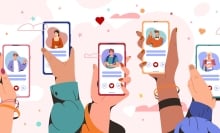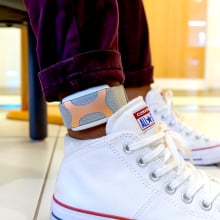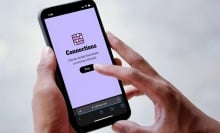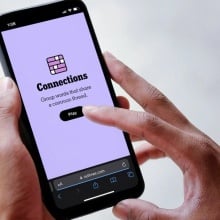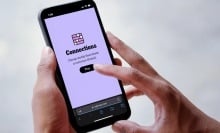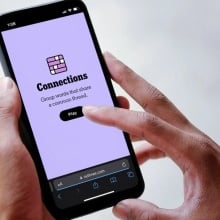One of the pitfalls of the later seasons of MTV's Catfish: The TV Show was the lack of any actual catfishes. When the show aired in 2012, Tinder was in its infancy, and a lot of the earlier participants of the show had begun their e-relationships through Facebook or MySpace. Online love during the aughts and early 2010s was hard and weird. And thanks to the show and growing tech literacy, deceptive online daters should've been a thing of the past — but it's still more common than ever and just as easy to do.
Almost anyone who's used a dating app in the last half decade or so has a story of being catfished (or, at least, someone trying to catfish them). And by "catfishing," we mean the act of creating a fake profile on social media or dating platforms to deceive others, often using someone else's pictures and information to create a false identity. Going on a date with someone who looks slightly less attractive than their dating profile does not constitute being catfished to be clear (it's technically "kittenfishing").
Someone might catfish others for various reasons, including seeking attention, attempting to escape their reality, pursuing deceptive romantic or financial gains, or simply for the thrill of the deception itself. Whatever the reason, if you're slightly familiar with the process of creating a dating account, then you know it's not that hard for a bad actor to start catfishing you.
Spam, scams, and fake accounts are oft the subjects of ire of online daters, especially for apps like Tinder, Bumble, and Hinge, who face backlash for how these online spaces have become a "paradise for predators." Spokespeople for Tinder and Bumble told Mashable through email that their platforms are continuously committed to fighting against deception through evolving spam detection filters and tech. They also made it clear that there are several tools and methods for the users themselves to deal with fake accounts by having users verify themselves and only interacting with other verified users. For example, on Bumble you can ask users to verify themselves before you can interact with them.
It's no surprise online dating apps would place a lot of the onus of protecting oneself on the users. That's how any social media company worth its salt avoids potential legal liability. But it did raise an interesting question that we wanted to put to the test: How easy is it to create a fake profile before the app catches me?
The answer: Uncomfortably easy.
Meet Chase

This is Chase. Well, this is actually my friend who so kindly let me use her photos on the condition I keep her anonymous for this article.
We created accounts on Tinder, Bumble, and Hinge to see if those apps would be able to detect a bad actor in their midst. Just to be clear, however, this did not mean we swiped or interacted with anyone on any of these apps as this experiment is only meant to see how the apps' systems detect and deal with fake profiles before they can reach users. We also chose to identify as a heterosexual woman as more U.S. men than women have ever used a dating app according to Pew Research Center — meaning it's easier to tell if the algorithms are showing our profiles to other men than it would be the other way around.
All that was needed to make these accounts was a phone number (I used two separate Google Voice numbers) and an email (preferably a real one but you can also use a randomly generated internet one).
That's how easy it was to make the accounts.
The experiment
To its credit though, Tinder stopped me almost immediately. That may have been due to the suspicious nature of the randomly generated email — it seems [email protected] isn't the most convincing email in the world. The account was shadowbanned from the start, not receiving a single like from the men in the area. The Tinder rep we spoke to also told us that multiple accounts made on the same device would be flagged and blocked.

So, naturally, we made a second account (using my own photos this time) and tried to log into the two accounts every few hours or so. When trying to log into our Catfish account, I was locked out until I verified the profile. Now, normally you can delete and redownload Tinder to get passed something like that, but no dice here — so anytime I try to delete and redownload, I'll be redirected to that verification screen, basically soft-locking me from ever using the app again on this phone.

Bumble and Hinge are different stories. Going through the same process as before, within 20 minutes of creating my Catfish Bumble account, I received over 40 likes. At the time of writing, it's now over 150+ likes.

Hinge gave us a little trouble during the account creation process, sending a registration code to the spam email I gave it. This forced me to use a personal Yahoo email that I use to sign up for free trials. After that, I had more trouble logging into that Yahoo account than I did creating the Hinge profile. We also went through the process of creating second accounts and swapping between them to see if Hinge and Bumble would flag that activity — no luck.
So it appears it is more than possible to keep a fake account on Bumble and Hinge without much pushback from the app. We reached out to Bumble and Hinge about our results with the former not responding to multiple requests for comment and the latter sending us this statement:
The safety of all Hinge users is our top priority, and we take all situations of fraud very seriously. We're constantly iterating and investing in new tools to ensure we're keeping our community as protected as possible, and have robust systems in place to detect, remove, and prevent bad actors from compromising the integrity of the Hinge community. We use a combination of machine-learning driven technology and highly trained content moderators to ensure users are abiding by our terms of service.
A slight problem with Hinge, though, is that the app allows users to change their purported location free of charge, unlike Bumble and Tinder which lock the feature behind their premium subscription paywalls. Potential catfish then have the world at their fingers to deceive and toy with.
That may sound dramatic, but being catfished is a psychologically damaging experience. Victims of catfishing can be led on for months by someone they developed feelings for and when taken too far, can also suffer financial damage. According to the Federal Trade Commission, Americans lost $547 million to romance scams in 2021 alone.
That's why in place of dating apps doing anything, we as always, have to be hyper-vigilant about the people we interact with on the internet. That means being wary of accounts that aren't verified, seem too professional, or hyper-edited. And it also means verifying if the person you're talking to is real by video-calling them either through Zoom or FaceTime.
Unfortunately, Catfish: The TV Show got renewed for a ninth season last month, so it doesn't look like this problem is going away anytime soon.
Topics Dating Sex & Relationships Tinder






